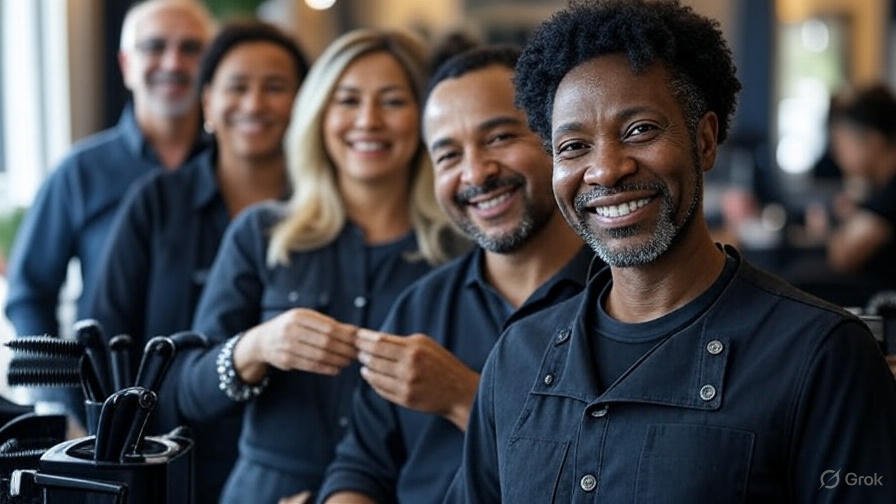Local Salon Owners Bring Fresh Energy to Traditional Industry

Content
In an era where big-box chains and franchise operations dominate many service sectors, a quiet revolution is taking place in beauty salons across the country. Local salon owners are breathing new life into a traditionally conservative industry, combining time-honored techniques with innovative approaches, community engagement, and a fresh perspective on what it means to be a beauty professional in the 21st century.
Breaking the Mold
For decades, the salon industry has been characterized by a somewhat rigid structure—glamorous images, standard service menus, and cookie-cutter interior designs. However, a new generation of salon owners is challenging these conventions and creating spaces that reflect their unique personalities and values.
Sarah Martinez, owner of “Rooted Hair Studio” in Portland, Oregon, exemplifies this trend. After working in corporate salons for nearly a decade, she opened her own space with a focus on sustainability and natural ingredients. “I wanted to create a salon that aligned with my values,” Martinez explains. “We use organic products, have solar panels, and even compost our hair clippings for local gardens.”
Technology Meets Tradition
While honoring classic beauty techniques, these local entrepreneurs are seamlessly integrating modern technology into their businesses. From mobile apps that allow clients to book appointments 24/7 to social media marketing that showcases transformation stories, tech-savvy salon owners are making their services more accessible and engaging than ever before.
In Austin, Texas, hair stylist and salon owner Marcus Chen developed his own booking platform after struggling with existing systems. His app now serves over 200 clients monthly and has inspired several other local business owners to adopt similar solutions. “Technology shouldn’t replace the personal touch,” Chen notes, “but it should enhance the experience and make it more convenient for everyone involved.”
Community-Centered Approach
Perhaps the most significant shift that local salon owners are bringing to the industry is their emphasis on community building. These businesses are becoming neighborhood gathering places where relationships extend far beyond haircuts and color treatments.
Melissa Thompson’s “Third Space Salon” in Denver has become known for its monthly community events, including local artist showcases, charity drives, and educational workshops. “We’re not just here to make people look good—we’re here to make them feel good about themselves and their community,” Thompson says.
This community-focused approach often extends to social causes as well. Many local salon owners are using their platforms to support local charities, promote body positivity, and create inclusive spaces for clients of all backgrounds and identities.
Education and Mentorship Revival
Unlike large corporate chains that may prioritize quick service over skill development, local salon owners are often placing renewed emphasis on education and mentorship. Many are investing heavily in continuing education for themselves and their staff, while also creating apprenticeship programs that nurture the next generation of beauty professionals.
Jennifer Park, who owns “Crafted Beauty” in Minneapolis, has established a formal mentorship program that pairs experienced stylists with newcomers to the industry. “The beauty industry has so much tradition and knowledge,” she explains. “It’s our responsibility to preserve the craft while evolving with the times.”
Economic Impact and Sustainability
Local salon ownership also brings significant economic benefits to communities. These businesses typically source products from local suppliers when possible, hire from within the community, and keep profits circulating locally rather than sending them to distant corporate headquarters.
Many local owners are also pioneering sustainable business practices within an industry that has historically generated substantial waste. From implementing water-saving systems to partnering with eco-friendly product lines, these entrepreneurs are proving that beauty services can be both profitable and environmentally responsible.
Challenges and Opportunities
Despite their innovative approaches, local salon owners face unique challenges. Competition from established chains, rising rent costs, and the constant need to stay current with trends can be overwhelming. However, many are finding success through creative marketing, niche specialization, and strong community connections.
The rise of social media has been particularly beneficial, allowing local salons to showcase their work and build followings that extend beyond their immediate geographic areas. Instagram tutorials, before-and-after transformations, and behind-the-scenes content have become powerful tools for attracting new clients and building brand loyalty.
The Future Looks Bright
As the beauty industry continues to evolve, local salon owners are positioning themselves at the forefront of change. Their willingness to take risks, embrace new technologies, and prioritize community relationships is not only revitalizing a traditional industry but also setting new standards for what client service can look like.
Industry experts predict that this trend toward locally-owned, community-focused salons will continue to grow, particularly among younger consumers who value authenticity, sustainability, and meaningful business relationships over corporate uniformity.
The success of these local entrepreneurs serves as a reminder that innovation doesn’t always require massive investment or revolutionary technology—it can be as simple as approaching an old industry with fresh eyes, genuine passion, and a commitment to serving not just clients, but entire communities.
In a world where many wonder if local businesses can compete with corporate giants, salon owners across the country are proving that with the right combination of skill, heart, and innovation, small businesses can not only survive but thrive, bringing renewed energy and purpose to industries that many thought were set in their ways.
